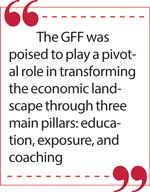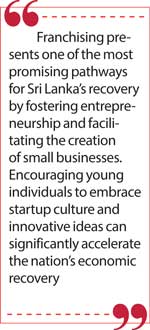Tuesday Feb 24, 2026
Tuesday Feb 24, 2026
Friday, 2 May 2025 00:00 - - {{hitsCtrl.values.hits}}

Gaurav Marya
Gaurav Marya is a pioneering entrepreneur, author, and business strategist renowned for his transformative impact on the franchising landscape across Asia. As the Chairman of Franchise India Group, he has been instrumental in guiding over 5,000 brands to establish expansive distribution networks, collectively valued at over $ 100 billion
His expertise lies in scaling businesses, fostering global partnerships, and advising on mergers and acquisitions. His passion for franchising was ignited during a 1998 visit to the United States, where he recognised its potential as a catalyst for business growth. This insight led to the establishment of Franchise India, which has since become a cornerstone in the franchising sector, facilitating over 200,000 business deals globally.
Marya’s influence extends beyond business; he is a sought-after speaker, having delivered keynote addresses at numerous international forums. His thought leadership is captured in his bestselling books, where he shares insights on entrepreneurship and business expansion. In Sri Lanka, his vision aligns with the nation’s aspirations to become a regional business hub.
Speaking to the Daily FT, he reveals his ambition to bridge international franchisors with local entrepreneurs – fostering economic growth, job creation, and innovation by introducing the Global Franchise Forum (GFF) to Colombo.
By Janani Kandaramage
 Q: What factors influenced your decision to host the GFF this year in Sri Lanka?
Q: What factors influenced your decision to host the GFF this year in Sri Lanka?
The decision to host the GFF this year in Sri Lanka stems from our strong belief that the nation is on the brink of an entrepreneurial revolution. With a vibrant and educated youth population eager to create their own businesses, there’s an opportunity to foster a culture of entrepreneurship in Sri Lanka not only helping local entrepreneurs but also aiming to attract global brands. The presence of established franchises can ignite local businesses to innovate and build their own brands.
In addition, the GFF was poised to play a pivotal role in transforming the economic landscape through three main pillars: education, exposure, and coaching. By raising awareness or rather informing aspiring entrepreneurs on choosing the right business, exposing them to varied opportunities, and providing tailored coaching-we can empower them to turn their entrepreneurial dreams to reality. This is the reason I see the GFF as more than just a franchise show, it’s a testament to Sri Lanka’s readiness to integrate into the global market while nurturing local talent.
Q: How does the GFF strive to empower and support local entrepreneurs, particularly small businesses in the country?
With small businesses representing 90% of enterprises worldwide, many face challenges in establishing themselves and often fail within the first five years due to a lack of prominent branding and operational systems.
Franchising offers a unique solution, combining local ownership with the benefits of global brands. By partnering with established franchises, local entrepreneurs can leverage recognisable names and proven business models, which significantly increases their chances of success. For instance, local franchises, like the Sheraton Motel we are sitting in, create jobs for Sri Lankans and contribute to the local economy, ensuring that profits stay within the community.
The GFF supports this model by facilitating connections between local business owners and international franchise brands, enabling the growth and resilience of small businesses in Sri Lanka
 Q: What limitations of franchising do you observe in Sri Lanka, and how can franchising serve as a tool for recovery and sustainable development as the nation reels from the economic crisis?
Q: What limitations of franchising do you observe in Sri Lanka, and how can franchising serve as a tool for recovery and sustainable development as the nation reels from the economic crisis?
Franchising presents one of the most promising pathways for Sri Lanka’s recovery by fostering entrepreneurship and facilitating the creation of small businesses. Encouraging young individuals to embrace startup culture and innovative ideas can significantly accelerate the nation’s economic recovery. The mindset among the people has shifted positively over the years, with more individuals understanding that change is achievable. This growing receptiveness creates an ideal environment for initiatives like the Global Franchise Forum, which aim to accelerate economic revitalisation via entrepreneurial growth.
However, I agree that to fully leverage franchising as a vehicle for growth, several limitations must be addressed. Infrastructure development is crucial, with projects such as the upcoming Port City positioned to create significant opportunities in retail, IT, and financial services.
In addition, reforms in the banking sector are mandatory to ease access to financing for aspiring entrepreneurs. There is also a pressing need to liberalise global remittance regulations, as current restrictions discourage foreign investment which is detrimental to sustainable development.
Also, investing in skill development across key sectors like healthcare and technology will equip the workforce with the capabilities needed for future growth.
Q: Elaborating on franchising, how can this phenomenon contribute to Sri Lanka’s economic growth further, particularly in terms of job creation and FDI?
A: Franchising plays a pivotal role in driving GDP growth by not only generating job opportunities but also by shifting our focus toward strengthening domestic consumption. While foreign direct investment (FDI) is important, an overreliance on it and export-driven models may not be sustainable. We must prioritise developing our own local brands and encouraging small businesses to flourish within the country. Expertise to launch brands can only be achieved via franchising which is a tried and tested business model, and therefore unlikely to make massive losses. For instance, when a franchise like Sheraton opens, it not only creates numerous jobs for Sri Lankans but also invites both domestic and international visitors, contributing to a thriving economy.
To draw parallels with successful frameworks like Singapore, it’s clear that fostering a robust domestic consumption model can lead to significant economic success. We need to expose the market to global brands, build homegrown Sri Lankan brands, and create small business opportunities that empower citizens to innovate and grow within their own country. This approach will discourage the mindset that working abroad is the only viable option and cultivate a culture where entrepreneurship is seen as a road to success.
Q: Drawing from your experiences in other markets, what best practices can be adopted to ensure successful franchising in Sri Lanka?
First and foremost, prioritising training and capability development is mandatory. Simply selling franchise opportunities is not enough – individuals must be equipped with the knowledge and skills to efficiently run and grow businesses. A strong emphasis on both vocational training and a reformed primary education system like I said earlier will lay the groundwork for future entrepreneurs.
 Analysing successful economies like the United States, we recognise that their robust educational frameworks cultivate innovation and talent. By investing in high-quality education, Sri Lanka can nurture a new generation of resilient entrepreneurs capable of driving sustainable growth.
Analysing successful economies like the United States, we recognise that their robust educational frameworks cultivate innovation and talent. By investing in high-quality education, Sri Lanka can nurture a new generation of resilient entrepreneurs capable of driving sustainable growth.
In addition, local stakeholders, such as chambers of commerce, must adapt to the evolving business landscape. These organisations must move beyond traditional methods and embrace contemporary business models. Many chambers still operate on outdated manufacturing and export frameworks, which limit their understanding of current franchising practices.
Chambers should actively promote entrepreneurial initiatives and engage in hosting events like the Global Franchise Forum to encourage dialogue and innovation, strengthening the franchising ecosystem in Sri Lanka.
Q: What sector in Sri Lanka do you perceive as ripe for franchising, and what makes them attractive to international brands?
A: One of the most promising areas for franchising is consumption-based businesses, especially in food, fitness, and lifestyle sectors. Fashion, in particular, stands out as a significant opportunity as Sri Lanka is known for producing high quality fashion product-a notable example being that 90% of Australia’s leading women’s wear brand is manufactured in Sri Lanka. This strong foundation offers potential for developing numerous local fashion franchises.
Sectors such as education and child development are gaining increasing attention. There is a growing need for quality training and skills development which creates a fertile ground for franchises focused on educational services.
Healthcare also represents an emerging market, particularly in pathology labs and clinical services which could benefit from franchise models to improve accessibility and quality of care.
Lastly, with tourism being a vital component of Sri Lanka’s economy, businesses that cater to this sector including hospitality and travel services are poised for franchising. I believe these sectors also align well with international brands seeking to invest in markets with proven potential.
Q: Where do you see Sri Lanka’s franchising landscape in the next five years?
A: Looking ahead to the next five years, I have great optimism about Sri Lanka’s franchising landscape. The country is poised for growth driven by a dynamic youth population eager to embrace entrepreneurship. While we must acknowledge that the economy is unlikely to see a sudden influx of large-scale job creation from major corporations, there is immense potential in fostering small businesses and innovative ideas that can generate employment opportunities, although on a smaller scale.
My personal mission is to democratise entrepreneurship, ensuring that anyone has the opportunity to start their own venture.
To facilitate this, I urge policymakers to focus on creating a business environment conducive to investment. This includes investing in infrastructure and providing accessible financing for new enterprises. By establishing a robust ecosystem that supports startups, we can drive a thriving economy in the years to come.